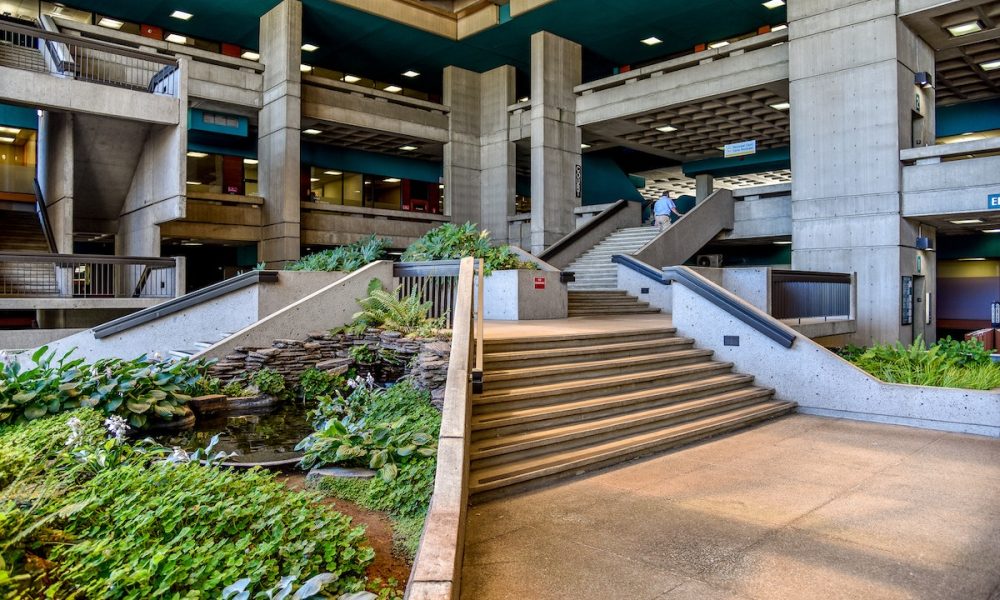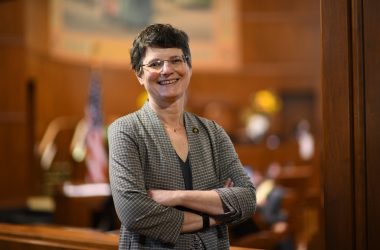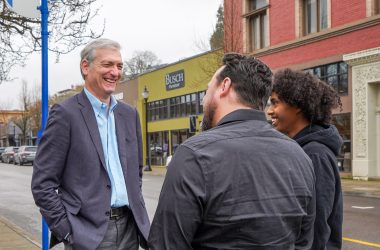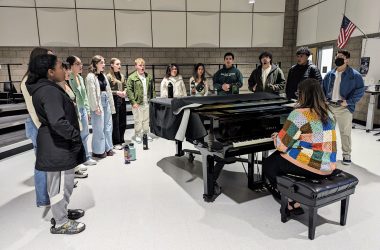 Lobby of Salem City Hall. (Salem Reporter files)
Lobby of Salem City Hall. (Salem Reporter files)
Updated 3:30 p.m. with more information about a proposed hub of electric vehicle chargers and the consideration of more bond measures.
Delivering the annual State of the City Address on Wednesday, Mayor Chuck Bennett visited a handful of major issues in Salem but homed in on one: a proposed third bridge to cross the Willamette River.
The second-term mayor said the Salem River Crossing, a project that Salem City Council will discuss Jan. 30 in a work session before hosting a council meeting in February, is “teetering on the brink of failure.”
He said that not building it would set back the work done over the last 13 years on this incarnation.
“We will have to make a whole new set of plans for resiliency related to our connectivity between West and East Salem if there is a major disaster,” Bennett told the crowd at the Salem Convention Center.
While the speech visited topics from homelessness to public safety to the downtown core, he noted the bridge’s importance both when talking about the city’s hopes to help congestion and when fielding a question about ways the city could do more to protect bicyclists.
“As we create more congestion in downtown Salem by failing to deal with another river crossing, that kind of congestion creates problems trying to get bike lanes put in,” he said. “It’s just one of those kinds of issues. We have to do it. Where are we going to put them? Because it’s just packed full.”
The comments peppered a speech that mostly revisited some broad topics facing Salem. But the speech included a few soft revelations, as well.
One revelation: Bennett said he plans to ask the city council to form a Resiliency Task Force to help guide the city’s response to a disaster.
“We have watched as communities around the world deal with devastating natural disasters. Salem is not immune,” he said, noting floods, earthquakes and wildfires. “Salem needs to address it and have a comprehensive, workable plan that brings services back online as quick as possible and addresses the toll in human suffering these kinds of events can exact from a community.”
Specifics about the task force are in short supply. Bennett said after his speech he envisioned the task force to be comprised of technical experts and first-responders. He said there could be seats for community members.
“You really have to look at the people who will be delivering the services and have the technical knowledge,” he said. “And we’ve got some very specific problems.”
To underline the need for such a task force, Bennett highlighted the recent algal bloom over the summer. He called it a “resiliency problem,” as the city had not planned on how to deliver water in an emergency. He said water lines would be damaged in the event of an earthquake.
“Those are the kinds of things people expect you have and we didn’t,” he said. “It isn’t an earthquake — it’s a different kind of resiliency. The water transmissions are old and if you get an earthquake those things are going to blow.”
Bennett also revealed the city is talking with Portland General Electric to add a so-called “Electric Avenue,” a bank of electric car chargers. He said the bank could serve four vehicles and that PGE would pay to build it and run it for 10 years.
The hub would be located on State Street near the Capitol building, said Kristin Retherford, director of the city’s Urban Development department. Retherford said PGE approached the city last fall. The two sides are near an agreement, she said, but are still figuring out how paid parking will factor in to the electric vehicle stations.
“I think from the city’s perspective there is strong interest in the community in curbing greenhouse gas emissions,” Retherford said.
And the city is eyeing more bond measures, Bennett said, as the $100 million bond that voters approved years ago for roads and bridges retires.
“In order to meet street, sidewalk and bridge needs it’s likely to require another bond measure to replace,” he said. “This and other bonding needs, such as fire equipment replaces, will be the subject of council and staff analysis over the next year to determine timing and size of bonds to be sent to voters over the next several years.”
Bennett’s speech did revisit other subjects that have been prevalent in the community.
On homelessness, he said it’s a complicated problem and one that governments haven’t historically spent public dollars to address. He noted the city-led Housing Rental Assistance Program, which works with private landlords to house people considered the hardest to help, has housed more than 100 people.
“If left alone the life expectancy of a person in this category on the streets of Salem is about 52 years. That, for me and I know for most of you, is an appalling situation,” he said.
Last year, a task force charged with finding ways to help the homeless also recommended adding storage and around-the-clock access to showers, laundry and toilets. A week ago, the city evicted a camp from under the Marion Street Bridge after a rise in reports of crime and vermin, according to City Manager Steve Powers.
Regarding the environment, the city is also expected to complete an inventory on greenhouse gas emissions. The data would work in tandem with other data the city is collecting for its upcoming overhaul of the city’s comprehensive plan.
Bennett noted Salem fielded 1,069 construction permits last year for an estimated $154 million worth of projects.
Have a tip? Contact reporter Troy Brynelson at 503-575-9930, [email protected] or @TroyWB.









